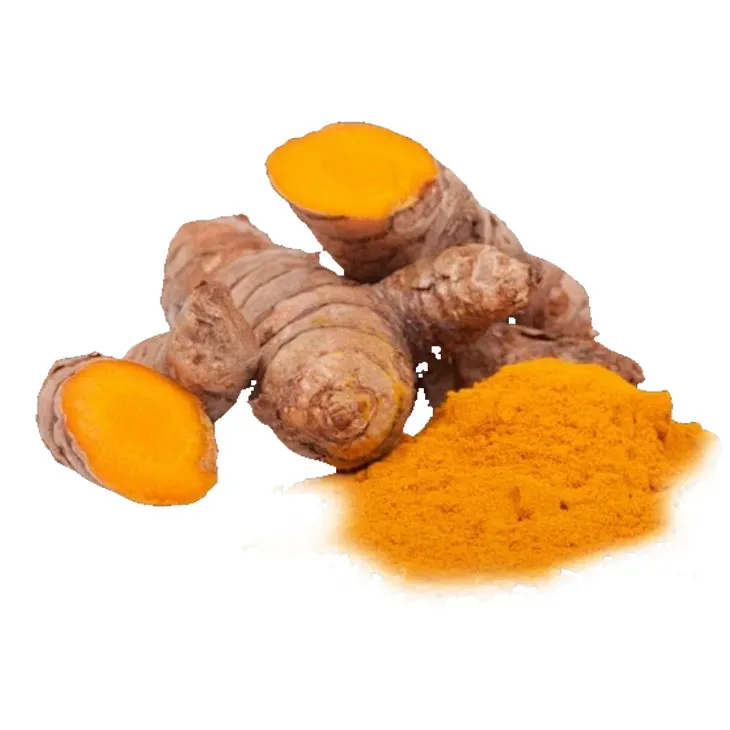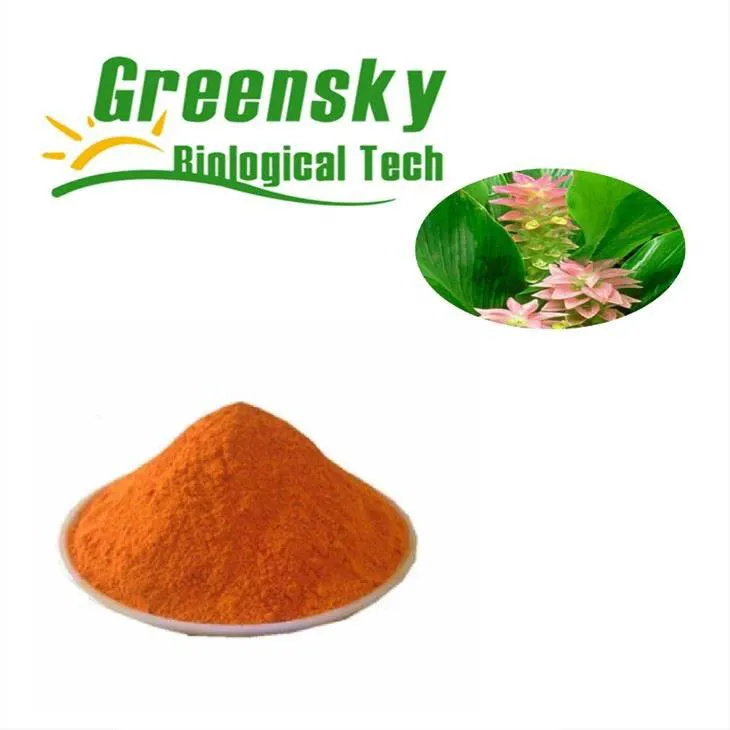- 0086-571-85302990
- sales@greenskybio.com
Is Curcumin a Plant Extract?
2025-03-18

Curcumin has gained widespread recognition as a powerful compound in natural medicine, celebrated for its anti-inflammatory, antioxidant, and therapeutic properties. It is commonly associated with the vibrant yellow spice turmeric, used for centuries in Indian, Asian, and Ayurvedic medicine. However, while turmeric and Curcumin are closely related, they are not the same. In this article, we will explore what Curcumin is, whether it qualifies as a plant extract, and its role in various health applications, shedding light on why this compound has become a staple in modern wellness regimens.
What Is Curcumin?
Curcumin is a naturally occurring chemical compound classified as a polyphenol. It is the primary bioactive substance in turmeric (Curcuma longa), a rhizomatous plant that belongs to the ginger family (Zingiberaceae). Turmeric is widely known for its deep orange color and aromatic flavor, and curcumin is what gives turmeric its characteristic yellow hue while being responsible for most of its health-boosting properties.
Curcumin represents one of several curcuminoids found in turmeric, alongside other related compounds such as demethoxycurcumin and bisdemethoxycurcumin. Among these curcuminoids, curcumin is the most studied and dominant compound, accounting for many of turmeric's medicinal and pharmacological effects.

Is Curcumin a Plant Extract?
Yes, curcumin is a plant extract. To understand this, it’s important to distinguish between the raw plant material (turmeric) and the active constituents (curcuminoids, including curcumin) that are concentrated through an extraction process.
Turmeric root is harvested, dried, and ground into a powder, creating the spice commonly used in cooking and traditional medicine. However, turmeric powder only contains about 2–8% curcumin by weight. To obtain curcumin in its pure form or at higher concentrations for medicinal purposes, turmeric undergoes an extraction process. Curcumin is isolated and refined from the turmeric root, creating a more potent supplement form of the compound.
This extraction process qualifies curcumin as a plant extract. It involves the use of solvents, such as ethanol or acetone, to separate the curcuminoids from the turmeric root, leaving other plant components, like fiber and non-active compounds, behind. The result is a Curcumin Extract, which is used in dietary supplements, functional foods, and various therapeutic applications.

Curcumin vs. Turmeric: Key Differences
While curcumin and turmeric are often used interchangeably, they are distinct in several ways:
Turmeric: A whole plant product derived from the rhizome of the turmeric plant. Turmeric powder contains curcumin alongside other bioactive compounds, nutrients, and fiber. It is often used in cooking, beverages, and as a colorant and flavoring agent.
Curcumin: A concentrated extract of turmeric's active compound, isolated for its potent medicinal properties. Curcumin is typically used in higher doses in dietary supplements, herbal remedies, and medical research.
In essence, while turmeric contains curcumin, curcumin is simply a concentrated and purified form of one of turmeric’s active components.

Health Benefits of Curcumin
As one of the most extensively studied natural compounds, curcumin has demonstrated a wide range of health benefits, largely thanks to its powerful anti-inflammatory, antioxidant, and therapeutic properties. Below are some of its most notable benefits.
1. Anti-Inflammatory Properties
Chronic inflammation is linked to a variety of health problems, including arthritis, cardiovascular disease, diabetes, and neurodegenerative disorders. Curcumin is one of nature's most potent anti-inflammatory agents; it works by inhibiting inflammatory molecules such as cytokines, COX-2, and nuclear factor-kappa B (NF-κB). These mechanisms make curcumin an effective remedy for conditions like osteoarthritis and rheumatoid arthritis, where inflammation plays a central role.
2. Antioxidant Effects
As an antioxidant, curcumin neutralizes free radicals, reducing oxidative stress in the body. Free radicals are unstable molecules that damage cells and contribute to aging, cancer, and chronic disease. By scavenging these harmful molecules, curcumin helps protect cellular structures and maintain overall health.
Additionally, curcumin stimulates the body’s natural antioxidant systems, such as glutathione production, further enhancing its protective effects.
3. Brain Health and Neuroprotection
Curcumin shows promise in supporting cognitive function and protecting against neurodegenerative diseases like Alzheimer’s and Parkinson’s. It crosses the blood-brain barrier, where it reduces brain inflammation, oxidative stress, and the buildup of amyloid plaques (a hallmark of Alzheimer’s). Preliminary studies suggest that curcumin may also enhance brain-derived neurotrophic factor (BDNF), a protein that supports neuron growth and repair.
4. Cardiovascular Benefits
Curcumin has demonstrated cardioprotective benefits by improving endothelial function, reducing oxidative stress, and lowering inflammation—key factors in heart disease development. Some studies also suggest its ability to lower LDL (bad cholesterol) and improve circulation, making it beneficial for maintaining cardiovascular health.
5. Immune System Support
The compound’s anti-inflammatory and antioxidant properties help strengthen the immune response. Curcumin may protect against infections, autoimmune disorders, and stress-induced immunosuppression by modulating immune system activity and reducing chronic inflammation.
6. Relief for Joint Pain
Curcumin is widely used to alleviate joint pain and stiffness caused by arthritis. Its ability to block inflammatory pathways gives it natural pain-relieving properties without the side effects commonly associated with non-steroidal anti-inflammatory drugs (NSAIDs).

Limitations of Curcumin
While curcumin is highly effective, it has some limitations, particularly its low bioavailability. This means the body has difficulty absorbing and retaining curcumin in therapeutic amounts. To address this, curcumin supplements often include bioavailability enhancers, such as piperine (black pepper extract), liposomes, or phospholipids like Meriva and BCM-95, which significantly improve its absorption and efficacy.

How to Incorporate Curcumin into Your Health Routine
Curcumin can be taken in various forms to cater to different needs, including:
Dietary Supplements: Capsules or tablets containing Curcumin Extract are the most common option. Many supplements include bioavailability enhancers to maximize absorption.
Golden Milk or Turmeric Lattes: A popular and delicious beverage combining turmeric powder, milk (or plant-based options), and spices. This is not as concentrated as a supplement but offers mild health benefits.
Powdered Turmeric: Used in cooking or as an ingredient in smoothies, soups, and other dishes. While less concentrated, it is a simple and accessible way to enjoy curcumin’s benefits.
Topical Applications: Curcumin creams and gels are used for localized inflammation and wounds.
Conclusion
Curcumin is indeed a plant extract, derived from the turmeric root to concentrate its bioactive properties. This powerful compound bridges the gap between traditional medicine and modern science, offering a wealth of evidence-based health benefits. From fighting inflammation and neutralizing oxidative stress to improving brain function and cardiovascular health, curcumin is truly a remarkable natural remedy.
Although curcumin does face challenges such as low bioavailability, advances in supplement formulations have made it easier for individuals to benefit from this compound. Whether incorporated as a turmeric-based spice or as a high-potency supplement, curcumin stands out as a cornerstone of natural medicine and a valuable tool for improving overall health and well-being.
- ▶ Hesperidin
- ▶ citrus bioflavonoids
- ▶ plant extract
- ▶ lycopene
- ▶ Diosmin
- ▶ Grape seed extract
- ▶ Sea buckthorn Juice Powder
- ▶ Beetroot powder
- ▶ Hops Extract
- ▶ Artichoke Extract
- ▶ Reishi mushroom extract
- ▶ Astaxanthin
- ▶ Green Tea Extract
- ▶ Curcumin Extract
- ▶ Horse Chestnut Extract
- ▶ Other Problems
- ▶ Boswellia Serrata Extract
- ▶ Resveratrol Extract
- ▶ Marigold Extract
- ▶ Grape Leaf Extract
- ▶ blog3
- ▶ blog4
- ▶ blog5
-
Can curcumin have side effects?
2025-03-18
-
Curcumin Extract: When Should You Take It?
2025-03-18
-
Is It OK to Take Curcumin Daily?
2025-03-18
-
What Is Curcumin Extract Used For?
2025-03-18
-
8 Benefits of Curcumin
2025-03-18
-
Artichoke Leaf Extract
2025-03-18
-
Coconut Water Powder
2025-03-18
-
Motherwort Extract
2025-03-18
-
Horse Chestnut Extract
2025-03-18
-
Curcumin
2025-03-18
-
Artichoke Extract
2025-03-18
-
Astaxanthin
2025-03-18
-
Aminolevulinic acid
2025-03-18
-
Yellow Pine Extract
2025-03-18
-
Avocado Extract Powder
2025-03-18





























